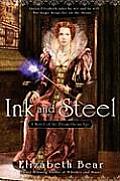
| Series: | Promethean Age #3 |
| Publisher: | Roc |
| Copyright: | July 2008 |
| ISBN: | 0-451-46209-2 |
| Format: | Trade paperback |
| Pages: | 427 |
Ink and Steel is set in the same universe as Blood and Iron and Whiskey and Water, but it starts a new duology and takes place four hundred years earlier. Reading the earlier books is not required before reading this one.
Christopher Marlowe (Marley here; spelling was far from standardized at the time) is, in this alternate magic-tinged history, an agent of Queen Elizabeth, occasional spy, member of a secret society called the Promethean Club that defends England against sorcery, and, of course, a playright and poet. Until, that is, he's betrayed and killed. But his death is not beyond the power of Morgan le Fay to reverse, the price being Kit Marley's binding to the world of fairy and the service of Morgan and her son Murchaud. Kit's close friend Will Shakespeare is left behind in Britain to continue the fight and take a similar role to the one Kit had, with his occasional help as Morgan permits. Meanwhile, the fairy teind to Hell is approaching.
It must be said up-front: yes, this is a novel with Marlowe and Shakespeare as primary viewpoint characters, an on-screen role for Queen Elizabeth, a wide-ranging cast of English nobility from the time, and frequent mentions of plays that Shakespeare writes during the story and that Marlowe had written before his death. The plays even have a specific and magical role in the plot. There's also a heavy helping of sensuality and sexuality, much of it gay. It does, to put it bluntly, feel a great deal like Marlowe and Shakespeare fan fiction. It explores the sort of ideas that fan fiction explores quite unabashedly. If your reaction to that is "oh, ugh, I have no interest at all," then skip this one; it isn't going to magically turn into something it's not.
That said, Ink and Steel more truly is alternate history, set in a world where the influence and presence of fairy is known to those who study such things, where magic exists and works, where plays weave spells to protect the kingdom, and where secret societies of spies fight covert battles for control of the country. (And where, it's necessary to mention, homosexual undertones are made quite explicit.) It felt stilted and a little ridiculous to me at first, but by the middle of the book it had grown on me; by the end of the book, I was very impressed. Bear paints a fascinating world of intrigue and emotion, turning both Marley and Shakespeare into human, struggling, hurting, and very likeable characters. Bear's handling of Shakespeare's personal life and marriage is particularly exceptional, building a believable and at times heart-rending story around the scant facts available, shifted and changed by her alternate history.
Like all of Bear's work, Ink and Steel is sometimes oblique to a fault. That works best in the Promethean series, though, since it's heavily concerned with fairy and Bear's fairy is perilous, unforgiving, and intentionally difficult to interpret. A story told by inference and innuendo fits a world that frequently feels like ascending a spiral staircase without bannisters. The rules Marley and later Shakespeare follow are from the logic of poetry and legend, symbol and allusion, and sudden dangers and traps. If the reader feels uneasy and without support, it matches how the characters feel.
That said, the story is still more oblique than I'd prefer, occasionally provoking frustration. It's also rich in characters, and while the large introductory dramatis personae helps, having to refer to it breaks the rhythm of the story. The widespread use of multiple names for the same person (which, it must be said, is historically grounded) doesn't ease the confusion, nor does the archaic dialogue and frequent (usually unexplained) quotations. I had to grope for meaning throughout just a bit more than was comfortable.
The power of this book, though, is in its exploration of emotions and the raw strength of Marley and Shakespeare's complex friendship. I may not have always understood the motives and details, but I cared about what happened to these characters, which is rather more important. The story drifts a bit for the first half of the book, setting up Marley's situation and the complex sides in both courts, but the second half of the book is excellent. Despite the setting of court intrigues, the story is more about personal demons, tragedies, hopes, and loves than it is about the politics. I found Bear's use of character emotion effective and powerful.
Ink and Steel reaches a conclusion of sorts, but it's really the first half of one long book (The Stratford Man). The ending is enough of a climax not to leave one unsatisfied, but quite a bit is left dangling and the main plot is not resolved. You'll probably want to have the next book handy.
Followed by Hell and Earth.
Reviewed: 2008-10-19